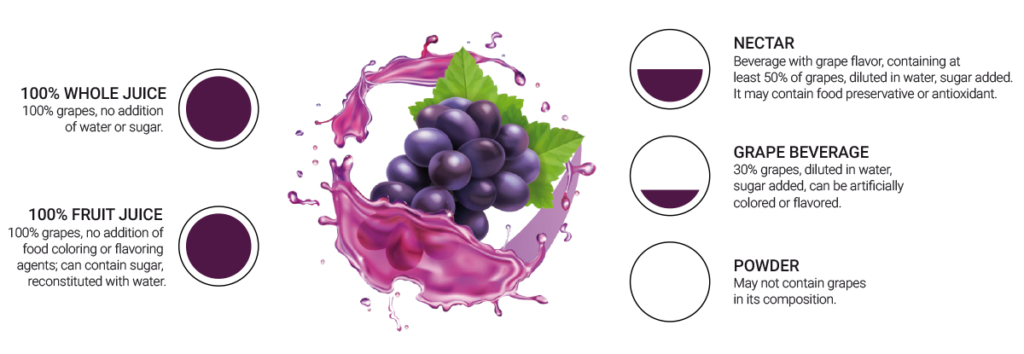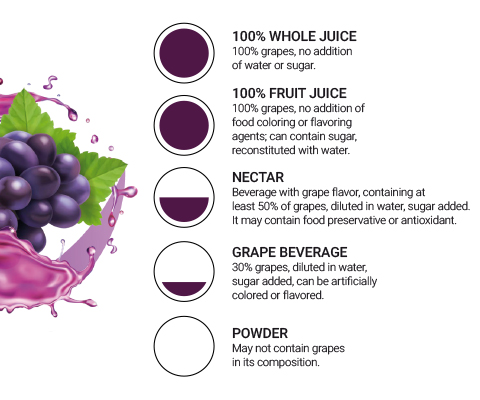HEALTH BENEFITS OF PURE GRAPE JUICE
Studies have shown that the red and white grape juices can have the same health benefits as wine, because they contain strong antioxidants known as polyphenols to which the good effects of wine (to the heart and overall body) are attributed. The polyphenols present in grape juices have shown the hability to avoid oxidation of the “bad cholesterol”, or LDL, that leads to the formation of plaques in arteries.
The natural sugar of the grape juice is composed of glicose and frutose which is directly absorbed by the body, and does not impose any effort to the digestive system/organs, thus making the pure grape juice a good and healthy option.
From the therapuetic side, it is one of the most precious juices. Grape juice offers several health benefits, such as: protection of the liver, reducction of fat cells accumulation, anti-inflammatory properties, ergogenic properties, among others.
MAIN EFFECTS OF GRAPE JUICE,
ACCORDING TO SCIENTIFIC STUDIES
-
Decrease of Body Mass Index (BMI) -
Decrease of waist circumference -
Lowering of blood sugar (glycemia) -
Increases insulin sensitivity -
Improves athletic performance -
Reduces muscle damage and inflammatory marker in athletes -
Reduces post-exercise hypotension among hypertensive individuals -
Reduces oxidative damage to the central nervous system, thus preventing neurodegenerative diseases such as Parkinson and Alzheimer -
Improves symptoms related to Parkinson’s Disease -
Reduces damage from free radicals in protein and lipids -
Prevents damage from free radicals caused by a high-fat diet to the liver and central nervous system (CNS) -
Anxiolytic and antidepressant effects -
Improves memory and cognition, including among the elderly -
Increases the expression of proteins in the hyppocampus, brain region associated with learning -
Reduces total cholesterol -
Reduces LDL (“bad cholesterol) -
Improves HDL (“good cholesterol”) -
Reduces triglycerides -
Decreases blood pressure -
Prevents fat plaque formation in arteries -
Reduces homocysteine levels (marker associated with cardiosvascular diseases)
Source: Professor and Dr. Caroline Dani
Master and PhD by Caxias do Sul University (UCS), Brazil
Postdoc by Georgetown University
www.drauva.com.br
NUTRITION AND HEALTH
The health benefits of grape and its by-products in one of the topics that have called the attention of consumers, lately. The consumption of grape juice is advantageous in relation to wine because it has the benefits of polyfenols, without the effects of alcohol. Grapes and their by-products also play an important social-economic role: more than 200,000 people in Brazil, mostly family farmers, live exclusively from grape and wine making.
Given all of these benefits, the scientific community has been working ever more to search and prove additional health benefit of this super fruit: grape.
The main benefits of grape juice, the real 100% grape juice, can be verified in these scientific articles (link).
Children’s Health
• Children are pure energy and spontaineity.
• They have a fast-paced physical, emotional and intelectual development, and yet, they keep an impressive vigour.
• A balanced diet is fundamental for the child’s perfect development.
• This diet must be rich in macro and micronutrientes, in order to cater to the needs of this phase of physical and mental growth.
• The rich composition of grapes and its juice is very important for bodies going through development.
• Grapes are among the sweetest and most caloric fruits: they contain around 15-17 grams of glucose and frutose, and 70 calories per portion of 100g of the fruit.
• Sugars from grapes are rapidly assimilated, meaning that its use is prioritized by our bodies’ metabolic reactions, preventing its accumulation in our organismo. That makes the grape a very useful metabolic/energetic restorative option before, during and after exercises, or in situations that demand a lot of energy, both physical or intelectual.
• It is important to know that the presence of Complex-B vitamins (mainly B1, B3 and B5) and of vitamin C in grapes, apart from mineral salts and trace elements like sodium, chlorine, potassium, calcium and iron, among others, are of vital importance to the formation and maintenance of the bones, blood, brain and nerves, which are essential during the growth development phase.
Heart Health
• Research shows that grape juice is rich in polyphenols, the same that are present in wine. Our heart health is greatly benefited by the consumption of theses polyphenols.
• Prevention of cardiovascular diseases
• Lowering of blood pressure
Mental Health
• Improvement of cognitive performance among youngsters and older adults
• Reduction of oxidative damage in brain structures; may reduce the risk of neurological diseases, like Alzheimer
• Improvement of cognitive functions and of memory
Juice & Memory
• Drinking grape juice (versus placebo) enhances the memory function among the elderly who suffer with memory loss due to advanced age; demonstrated in MRI exams
• In this study, grape juice drinkers had an increase in blood flow in two regions of the brain that are linked to memory, compared to other specific brain areas.
• Juice and health of the immune system
• Healthy adults that regularly drank grape juice (100% juice), had an increase in cells related to the immune system
• Juice and epigenetic
• Drinking grape juice during pregnancy favors the health of future generations
SOCIAL BENEFITS AND
ENVIRONMENTAL CARE

>> The text is missing.
RECIPES
Click here and discover other incredible recipes!
GRAPE GLOSSARY
Pure grape juice: juice made 100% from grapes, no addition of water, sugar, food preservative or antioxidant.
Whole grape juice: juice made 100% from grapes, no addition of water or sugar, may contain food preservative or antioxidant.
100% grape juice – reconstituted juice, originated from concentrated juice, with water addition, can contain sugar, food preservative or antioxidant.
Nectar: beverage with grape flavor, containing at least 50% of grapes, diluted in water and sweetened. It may contain food preservative or antioxidant.
Grape beverage: beverage that tastes like grape, made with a minimum of 30% grapes. It contains water and sugar, can contain food preservative or antioxidant.
Antioxidants: compounds present in food and beverages that may help protect healthy cells from the damaging effects of free radicals.
Free radicals: atoms or groups of atoms that have one or more unpaired electrons. They are produced by our body during common activities such as exercises or digestion (when the body converts food into energy). Free radicals are highly reactive, but our bodies have a natural defense system, meaning that when in small quantities, they do not impose any problems. However, when we are exposed to environmental factors like pollution and UV radiation may also lead to the formation of free radicals. When there is a high amount of free radicals for our bodies to combat, they can initiate a harmful chain reaction, that in turn, can result in oxidative stress.
Flavonoids: the largest and most studied subgroup of polyphenols; represent the majority of polyphenols found in Vitis labrusca grapes.
Oxidative stress: a condition that can damage healthy cells. It has been identified as a possible contributor to certain chronic health issues.
Polyphenols: a subgroup of phytonutrients, found in foods such as onions, grapes, a few nuts, tea, and red wine. Polyphenols naturally protect plants against pathogens, parasites and predators, and many times contribute to the flavor and color of fruits and vegetables.
Resveratrol: natural compound (a polyphenol) that can sometimes be found in the skin of dark grapes found from colder climates, where there is less sunlight and more rainfall. Certain plants produce resveratrol when responding to environamental stress, like fungus infections. Scientists have studies resveratrol as a possible connection with the French Paradox (related to the health benefits of consuming red wine).





